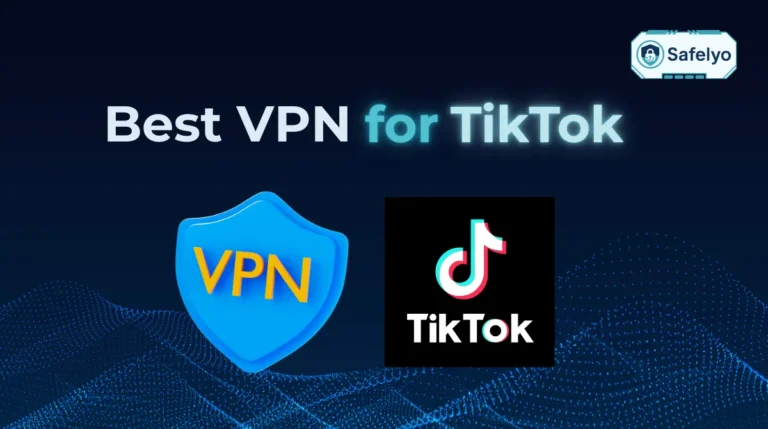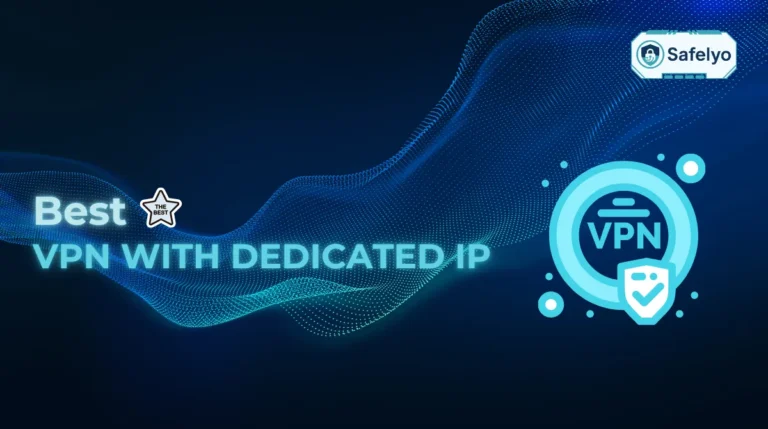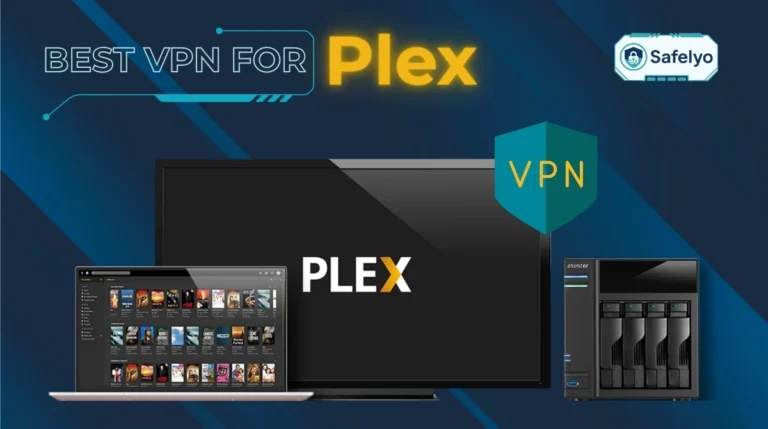When you’re packing for a trip, you run through a mental checklist: Passport, tickets, travel adapter. But in our hyper-connected world, there’s a digital essential that’s just as crucial for a smooth and safe journey: a reliable VPN for travelers.
As a frequent international traveler and a cybersecurity analyst for over a decade, I’ve made it my mission to test these tools in the real world. I’ve seen firsthand how a single connection to unsecured airport Wi-Fi can expose sensitive data. Personally, I’ve relied on a VPN to access my online banking from halfway across the globe without triggering a security freeze. A VPN isn’t just a tool for tech experts; it’s a fundamental part of a modern traveler’s toolkit.
Key takeaways:
- 5 best VPN for travelers: NordVPN, ExpressVPN, Surfshark, CyberGhost, Proton VPN
- A VPN’s primary role for travelers is to secure your data on public Wi-Fi and unblock content from home.
- NordVPN is our top recommendation for its unbeatable combination of speed, security, and a massive server network.
- A VPN can genuinely save you money on bookings, often paying for the subscription with a single trip.
- The most important rule: Always install and test your VPN before you leave home.
Don’t let an insecure network or a geo-block ruin your adventure. Let me be your trusted guide to a secure and unrestricted travel experience.
1. Our top 5 VPN picks for travelers in 2025
Not all VPNS are created equal when it comes to the demands of travel. A good travel VPN needs a vast server network, fast and stable connections, easy-to-use mobile apps, and strong security features. After testing dozens of services on the road, these are the five providers that have proven to be the most reliable travel companions.
| Rank | Best For | Key Travel Features |
| #1 – NordVPN | Overall Performance & Security | Vast server network, fast speeds, Threat Protection, and Obfuscated Servers. |
| #2 – ExpressVPN | Reliability & Ease of Use | Works in 105 countries, has very user-friendly mobile apps, and uses TrustedServer Technology. |
| #3 – Surfshark | Budget Travelers & Families | Unlimited devices, great price, stable connections. |
| #4 – CyberGhost | Beginners & Streaming | Easy to use, clearly labeled streaming and gaming servers. |
| #5 – Proton VPN | Privacy in Restrictive Countries | Secure Core servers, Swiss-based, good free plan for emergencies. |
A VPN’s features on paper don’t mean much if it’s slow or clunky to use when you’re trying to quickly connect in a busy airport. I’ve tested these apps in real-world travel scenarios – from hotel lobbies to international airports – to see how they really perform.
1.1. #1 – NordVPN
NordVPN hits the sweet spot for travelers. It offers a perfect blend of a massive global server network (6,300+ servers in 111 countries), blazing-fast speeds with its NordLynx protocol, and a suite of powerful security tools. In my experience, it’s the most reliable all-rounder, whether I’m working from a cafe in Lisbon or streaming a show from a hotel in Tokyo.
PROS
- Huge server network ensures a fast connection nearby.
- Threat Protection adds crucial security on public Wi-Fi.
- Obfuscated servers for bypassing censorship.
CONS
- The sheer number of features can be a bit overwhelming for new users.
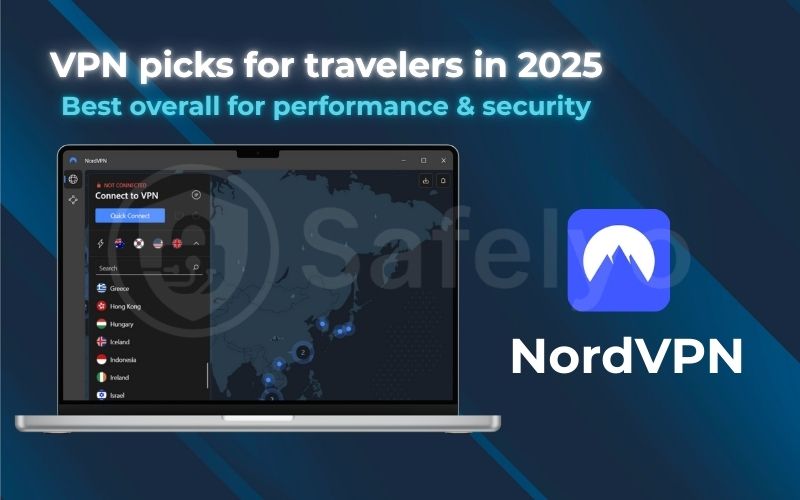
Hands-on experience
The mobile app is intuitive and connects to servers in just a few seconds. The interactive map interface is particularly useful on a phone, as you can just pinch, zoom, and tap on a country pin to connect. One of my favorite features is Threat Protection Lite. When I connect to an unfamiliar hotel Wi-Fi, it automatically blocks trackers and malicious websites, giving me an extra layer of peace of mind without having to think about it.
Key travel feature - obfuscated servers
For trips to more restrictive countries, NordVPN’s obfuscated servers are a must-have. I’ve used this feature to access social media from locations where it would otherwise be blocked. It’s easy to enable in the settings and is crucial for maintaining digital freedom where it’s not guaranteed.
Digital nomad perspective
As someone who often works on the road, stable connections and fast upload speeds are non-negotiable for video calls. NordVPN has consistently provided a reliable connection that’s fast enough for me to run my business from anywhere with a decent Wi-Fi signal.
NordVPN – Best overall for performance & security
For the traveler who wants top-tier performance, robust security, and reliable connections no matter where their journey takes them, NordVPN is the best choice on the market.
1.2. #2 – ExpressVPN
ExpressVPN‘s reputation is built on reliability and simplicity. Its mobile apps are, in my opinion, the most user-friendly of any VPN. For a traveler who just wants to press a single button and know they are protected, there is no better experience. Their server network is also incredibly widespread, covering 105 countries – more than almost any other provider.
PROS
- Incredibly easy-to-use mobile apps.
- Massive country selection (105 countries).
- Rock-solid reliability and speeds.
CONS
- This is one of the pricier VPN choices available.
- Fewer simultaneous connections than competitors like Surfshark.
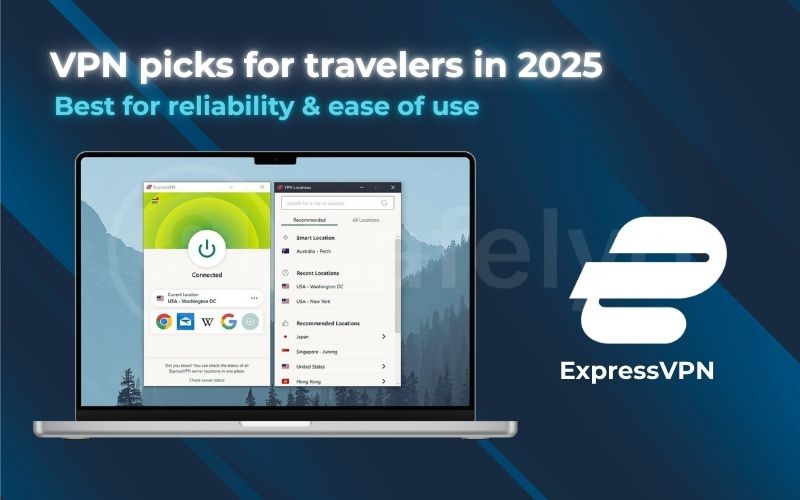
Hands-on experience
The mobile app is a masterclass in design. It features a single, large “On” button that makes connecting foolproof. Switching VPN servers is just as simple, with a clear and responsive server list. I often recommend ExpressVPN to friends and family who are new to VPNs because I know they won’t get confused by complex settings. The connection is established quickly and is rock-solid.
Key travel feature - trusted server technology
ExpressVPN runs all of its servers on RAM, which they call TrustedServer technology. This means all data is wiped with every reboot, ensuring no user logs can ever be stored or seized. For a traveler concerned about privacy, this provides an exceptional level of assurance.
Digital nomad perspective
The sheer number of countries ExpressVPN covers is a huge asset. If you’re working from less common locations, there’s a higher chance ExpressVPN will have a server nearby, ensuring better speeds and lower latency for your work.
ExpressVPN – Best for reliability & ease of use
For the traveler who values a simple, elegant, and “it just works” experience, ExpressVPN is a premium and highly reliable choice. It’s the least likely to cause you any technical headaches on your trip.
1.3. #3 – Surfshark
Surfshark delivers incredible value, making it my top pick for budget-conscious travelers, families, and digital nomads with lots of gadgets. Its killer feature is its unlimited simultaneous device connections. For the price of one subscription, you can protect your phone, your laptop, your partner’s phone, and your kids’ tablets.
PROS
- Unlimited device connections.
- Extremely affordable on long-term plans.
- Clean and easy-to-use apps.
CONS
- Speeds can be slightly less consistent than the top-tier providers.
- Smaller server network than NordVPN.
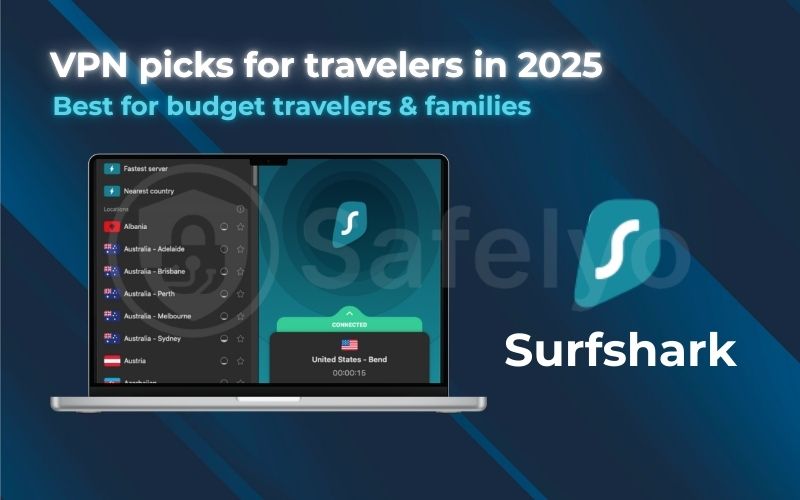
Hands-on experience
The Surfshark mobile app is clean, modern, and easy to navigate. It doesn’t have the visual flair of NordVPN’s map, but its simple list-based interface is fast and effective. Connecting to a server is quick, and I’ve found their connections to be very stable, which is impressive for a service at this price point.
Key travel feature - unlimited connections
When I travel with my family, this feature is a lifesaver. I don’t have to worry about who is connected or logging out of one device to use another. We can all connect to the hotel Wi-Fi and turn on the VPN on all our devices simultaneously, ensuring everyone is protected.
Digital nomad perspective
For a digital nomad with a phone, a laptop, a tablet, and maybe a backup device, the unlimited connections policy is a massive financial and logistical win. The price is so low on their long-term plans that it’s an easy business expense to justify for complete digital protection.
Surfshark – Best for budget travelers & families
For anyone traveling on a budget, with a family, or with a bag full of tech, Surfshark offers unbeatable value. It provides robust security and reliable performance without the premium price tag.
1.4. #4 – CyberGhost
CyberGhost is designed from the ground up to be incredibly beginner-friendly. Its standout feature is its dedicated, optimized servers for streaming. If your main reason for getting a travel VPN is to keep up with your favorite shows from home, CyberGhost makes the process foolproof.
PROS
- Streaming-optimized servers make unblocking content incredibly easy.
- Very user-friendly app for beginners.
- Huge server network.
CONS
- Not as fast as the top competitors.
- Lacks advanced features like obfuscation for restrictive countries.
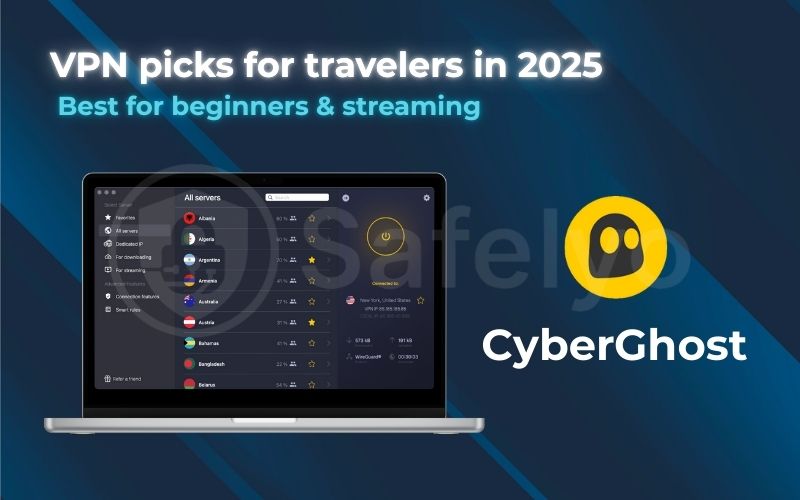
Hands-on experience
The mobile app is bright and easy to navigate. Its best feature is the “For Streaming” server list. Instead of guessing which US server will work with Hulu, you can just scroll down the list, find the server clearly labeled “Optimized for Hulu,” and connect. I’ve used this feature many times, and it saves a lot of trial-and-error.
Key travel feature - travel rule
CyberGhost’s “Smart Rules” feature allows you to create automations. You can create a “Travel Rule” that tells the app to automatically launch and connect whenever your phone joins an unsecured Wi-Fi network. This is a fantastic “set it and forget it” feature for travelers.
Digital nomad perspective
While not as fast as NordVPN, the optimized servers are still a great asset for unwinding after a day of work. The ease of finding a working server for a specific streaming service is a welcome convenience.
CyberGhost – Best for beginners & streaming
If you’re new to VPNs or your primary goal for traveling is to easily access streaming content from around the world, CyberGhost is the most user-friendly option you can choose.
1.5. #5 – Proton VPN
Proton VPN is built by the same team of scientists and engineers who created the encrypted email service, Proton Mail. Their entire focus is on security and privacy, making them my top recommendation for journalists, activists, or anyone traveling to a country with heavy internet surveillance.
PROS
- Secure Core servers offer unmatched security.
- Based in privacy-haven Switzerland.
- A fantastic free plan that offers unlimited data for emergencies.
CONS
- Speeds can be slower, especially when using Secure Core.
- Smaller server network than other top providers.

Hands-on experience
The mobile app is clean, professional, and focuses on security. Its standout feature is Secure Core. When you enable it, your traffic is first routed through an ultra-secure server in a privacy-friendly country (like Switzerland or Iceland) before it goes to your final destination. This adds a powerful layer of double encryption that makes your connection extremely difficult to trace.
Key travel feature - Swiss privacy laws
Proton VPN is headquartered in Switzerland, which has some of the strongest privacy laws in the world. This legal protection means they cannot be legally compelled to log user data, providing a powerful layer of trust.
Digital nomad perspective
For digital nomads handling sensitive client data or communicating about confidential topics, the extra layer of security from Secure Core provides invaluable peace of mind. The free plan, while limited, is also the most generous I’ve seen and serves as a fantastic emergency backup if your primary VPN has an issue.
Proton VPN – Best for privacy in restrictive countries
If your travels take you to high-risk locations or if your primary concern is maximum security and privacy, Proton VPN is in a class of its own. It’s the choice for the traveler who needs to be absolutely certain their connection is secure.
2. 4 key reasons you absolutely need a VPN for travel
Before we dive into which VPN to choose, let’s quickly cover why it’s as essential as your passport. In my years of traveling, I’ve come to rely on a VPN for these four critical reasons. It’s moved from a “nice-to-have” to a “can’t-leave-home-without” tool.
1. Secure your data on public Wi-Fi
Think about the last time you were at an airport, hotel, or café. You probably connected to their free Wi-Fi without a second thought. The problem is, these networks are notoriously insecure. They are a playground for hackers and data thieves who can easily position themselves between you and the Wi-Fi router to intercept your data.
A VPN solves this by creating an encrypted VPN tunnel for your connection. Imagine you’re sending a postcard (your data). Without a VPN, anyone can read it. With a VPN, that postcard is locked inside a sealed, metal briefcase. Even if a hacker intercepts the briefcase, all they’ll see is unreadable code. This is how you can safely check your bank balance or answer work emails from the airport lounge.
>> Read more: 5 best VPN for public Wi-Fi security (tested)
2. Access your content from home
You’ve just settled into your hotel room after a long flight, ready to unwind with your favorite show on Netflix, only to be greeted by a “This title is not available in your region” error. This is geo-restriction in action. Many streaming services, online banking portals, and even local news websites are licensed to work only in specific countries.
A VPN lets you digitally teleport home. When you connect to a server in your home country, you’ll receive an IP address associated with that country. To a website like Netflix, it looks like you never left. Suddenly, your familiar library reappears, and your online bank lets you log in without issue.
3. Bypass local censorship
When traveling to countries with restrictive internet laws, you may find that social media sites like Facebook, news outlets like the BBC, and communication apps like WhatsApp are completely blocked.
A VPN for travelers with a feature called “obfuscation” is the key to bypassing these blocks. This technology disguises your VPN traffic to look like normal internet activity, making it much harder for national firewalls to detect and block. It’s an essential tool for maintaining your connection to the outside world and your freedom of information.
>> You may also be interested in: Best VPN for censorship bypass: 5 options that actually work
4. Save money on bookings (yes, really)
This is the travel hack that most people don’t know about. Prices for flights, hotels, and car rentals can change dynamically based on your physical location (or rather, your IP address). An airline might show a higher price to a user searching from a wealthy country like Switzerland than to a user searching from Mexico.
A VPN allows you to “shop” for travel from different countries. Connecting to a server in a different location can often lead to much better deals on the same booking. I do this for every trip I plan, and the savings can be substantial. We’ll show you a real-world example of how we did this later in the guide.
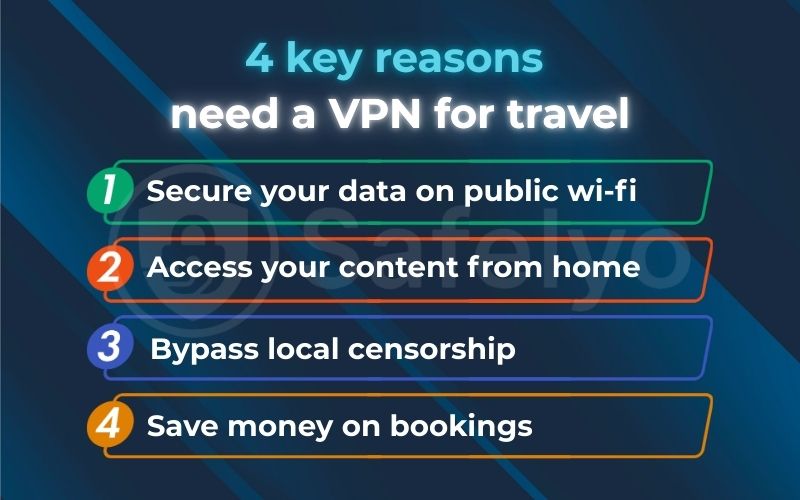
3. Case study: I saved $120 on a flight using a VPN
One of the most underrated benefits of a VPN for travelers is its ability to save you real money. Prices for flights, hotels, and rental cars are often dynamic, meaning they change based on the country you’re booking from. To put this to the test, we conducted a real-world experiment.
The test: I searched for a round-trip flight on Google Flights for one person, flying from New York (JFK) to London (LHR) three months in the future. We cleared our browser cookies before each search and connected to high-quality VPN servers in different countries to observe how the price changed for the same flight on the same airline.
The results were staggering:
| Our IP Location (via VPN) | Price Shown for the Same Flight | Potential Savings |
| United States (NYC) | $650 | – |
| United Kingdom (London) | $640 | $10 |
| Mexico (Mexico City) | $580 | $70 |
| Turkey (Istanbul) | $530 | $120 |
The conclusion:
By simply connecting to a VPN server in Turkey, we found the exact same flight for $120 less. That single saving is more than enough to pay for a two-year NordVPN or Surfshark subscription.
From my own travel planning, I’ve found that this trick works best with international flights and car rentals. The savings on hotels are usually smaller but can still add up. The key is to experiment with servers in countries with a lower cost of living or in the airline’s home country. It’s a five-minute process that can have a huge impact on your travel budget.
4. The ultimate digital security checklist for travelers
A VPN is your most important travel security tool, but it’s most effective when it’s part of a larger strategy. As a frequent traveler, I’ve developed a simple digital hygiene routine that I follow for every trip.
Think of this as your pre-flight and in-flight check for your digital life. Use this list to ensure you’ve covered all your bases.
Before You Go (At Home)
| Done? | Task |
| [ ] | Install and test your VPN: Install the app on your phone, laptop, and tablet before you leave home. Connect to a few servers to ensure it’s working correctly. |
| [ ] | Download offline maps: Use Google Maps or a similar app to download the map of your destination for offline use. |
| [ ] | Enable Two-Factor Authentication (2FA): Secure your critical accounts (email, banking, social media) with 2FA for an extra layer of security. |
| [ ] | Inform your bank: Let your bank and credit card companies know your travel dates and destinations to prevent them from freezing your accounts. |
| [ ] | Back up your devices: Perform a full backup of your phone and laptop to the cloud or an external hard drive. |
During Your Trip (On the Road)
| Done? | Task |
| [ ] | Activate your VPN on all public Wi-Fi: Make it a reflex. Before checking email or browsing, turn on your VPN. Enable the “auto-connect on unsecured networks” feature if your app has it. |
| [ ] | “Forget” networks after use: Once you’re done with a public network, go into your device’s Wi-Fi settings and select “Forget This Network” to prevent auto-reconnecting. |
| [ ] | Avoid public USB charging ports: Use your own power adapter and a wall outlet, or a portable power bank, to avoid “juice jacking” security risks. |
| [ ] | Turn off Bluetooth and Wi-Fi when not in use: When walking around, disable these services to prevent your device from searching for connections and to save battery life. |
5. Is it legal to use a VPN while traveling?
This is a critical question, and thankfully, the answer is straightforward for most of the world. In most countries that tourists frequently visit, using a VPN is completely legal. It’s seen as a legitimate tool for privacy and security.
However, a handful of countries have specific regulations, restrictions, or outright bans on VPN use that every traveler should be aware of. To simplify this, I’ve broken it down into a simple map.
VPN Legality Around the World: A Quick Guide
- Green countries (VPN is legal): This includes the United States, Canada, the UK, all of the European Union, Australia, and most of South America. In these places, you can use a VPN freely without any legal concerns.
- Yellow countries (VPN is restricted): This group includes countries like China, Russia, Turkey, and the United Arab Emirates (UAE). These governments heavily regulate the internet and often block VPN services. While it’s not typically illegal for a foreign visitor to use a VPN (especially for accessing sites from their home country), the government actively tries to block the technology. This is why choosing a VPN with obfuscation is crucial for travel to these destinations.
- Red countries (VPN is illegal): In a few countries, such as North Korea, Turkmenistan, and Belarus, the use of unapproved VPNs is illegal for everyone, including visitors, and can carry serious penalties.
My rule of thumb is simple: Before I travel anywhere new, I always do a quick search for “[country name] VPN laws”. It’s a five-second step that provides essential peace of mind and ensures I’m respecting local regulations. This guide is for informational purposes and is not a substitute for legal advice.
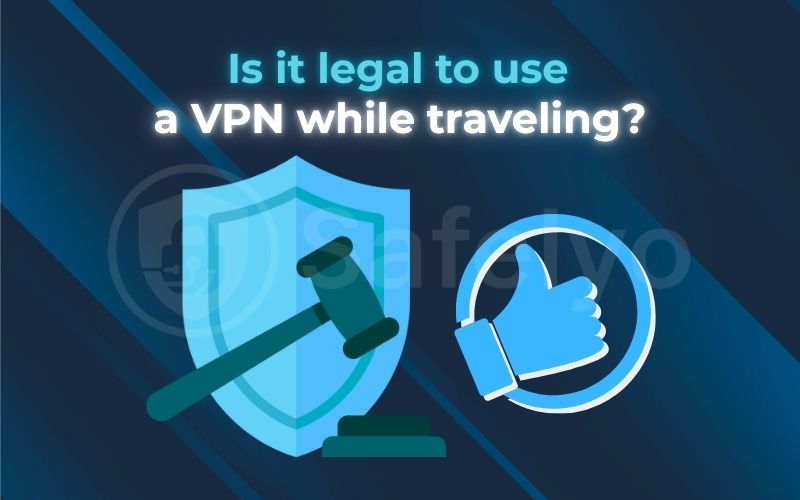
Safelyo’s expert tip: Automate your protection
The biggest security risk when traveling isn’t a sophisticated hacker; it’s simply forgetting to turn on your VPN. In the rush to check emails or find directions after connecting to a new Wi-Fi network, it’s easy to overlook.
To combat this, I highly recommend diving into your VPN app’s settings and enabling the ‘Auto-connect on Wi-Fi’ feature. You can often configure it to automatically establish a secure connection whenever you join any network, or even better, whenever you join an unsecured network (like most public Wi-Fi). This simple, one-time tweak turns your VPN from a tool you have to remember into an automatic bodyguard that’s always on duty.
6. FAQ about the best VPN for Travelers
Here are the direct answers to the most common questions we receive from travelers preparing for their trips.
What is the best VPN for travelers?
Based on our extensive real-world testing, NordVPN is the best all-around VPN for travel. It offers the best combination of a massive global server network, industry-leading speeds, and powerful security features like Threat Protection and obfuscation, making it a reliable choice for any destination.
Is it worth getting a VPN for travel?
Yes, absolutely. A VPN is an essential travel tool. Its primary benefits – securing your data on public Wi-Fi and allowing you to access your home content like streaming and banking apps – are crucial for any modern traveler. Plus, as our case study showed, it can even save you money on bookings.
Can you get a VPN while traveling?
You can try, but we strongly advise against waiting. In many countries with internet restrictions, such as China or the UAE, the websites of VPN providers are often blocked. This can make it impossible to sign up and download the app once you’ve arrived. Always install and test your VPN before you leave home.
What is the best VPN for travel to China?
Traveling to China requires a VPN with powerful obfuscation technology to bypass the Great Firewall. Based on recent performance, NordVPN and ExpressVPN are two of the most reliable choices that are consistently reported to work within the country.
Will a VPN use a lot of my mobile data?
No. The data overhead from VPN encryption is very small, typically adding only 5-15% to your total data usage. The vast majority of data consumed will be from your actual activity (streaming, browsing, etc.), not the VPN itself.
How do I use a VPN to book cheaper flights?
First, clear your browser’s cookies and cache or open an incognito window. Then, connect to a VPN server in a country with a lower cost of living (e.g., Mexico, Turkey, India) or the airline’s home country. Search for your flight and compare the prices to what you see without a VPN.
Do I need a VPN with a travel router?
If your travel router has a VPN installed on it, then any device connected to that router’s Wi-Fi network is already protected. You wouldn’t need to run a separate VPN app on your phone or laptop in that case. However, most travel routers do not have a built-in VPN, so you would still need to use a VPN app on your individual devices.
7. Conclusion
A VPN is no longer a luxury for travelers; it’s an essential tool for staying safe, connected, and even saving money on your adventures. From protecting your banking details in a hotel lobby to catching up on your favorite shows from halfway across the world, a reliable VPN offers peace of mind and unlocks a truly global internet experience.
Travel smart and travel safe. By choosing a reliable VPN and following good digital hygiene practices, you can explore the world with confidence. Your travel security is just the beginning. Explore the full suite of Best VPN guides by Safelyo to protect every aspect of your digital life, at home and abroad.

